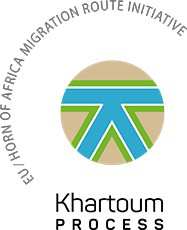Two thirds into 2020, the trio of linked crises — the COVID-19 pandemic and the accompanying economic and protection crises — have been affecting mixed migration dynamics all over the world. Countries along the migration route between the Horn of Africa and Europe are no exception to this reality.
Understanding the medium- and long-term implications of COVID-19 on migration for Khartoum Process partners poses a series of questions: How will the crisis impact mixed migration drivers, the aspirations of potential migrants and their capacity to move? In light of a potential increase in the aspirations (or need) to migrate, and rising border restrictions, will the demand for smuggling services increase? How is the crisis impacting the journeys of people on the move and their exposure to protection violations? How does this affect particularly vulnerable groups, such as families with children and women traveling alone? What are the implications for national and regional migration policies and responses?
Against this backdrop, the Chair of the Khartoum Process, The Netherlands, welcomed the opportunity to work together with the Mixed Migration Centre (MMC) and facilitate a data-driven discussion during a webinar on Mixed Migration and the COVID-19 crisis: What’s next for people on the move in the “New Normal”?
The webinar was organised on 8 October 2020 and it featured presentations by MMC experts based on data collected since April 2020, through the MMC Mixed Migration Monitoring Mechanism Initiative (4Mi). This data was collected via approximately 4,000 interviews with refugees and migrants in Djibouti, Ethiopia, Kenya, Libya, Somalia, Sudan, and Tunisia focusing on the impact of COVID-19 on their lives and migration journeys, risk awareness, access and barriers to healthcare and protection needs.
This unique dataset provided critical information to support reflections and discussions on the above questions and around responses to the evolving situation in the Khartoum Process region.
